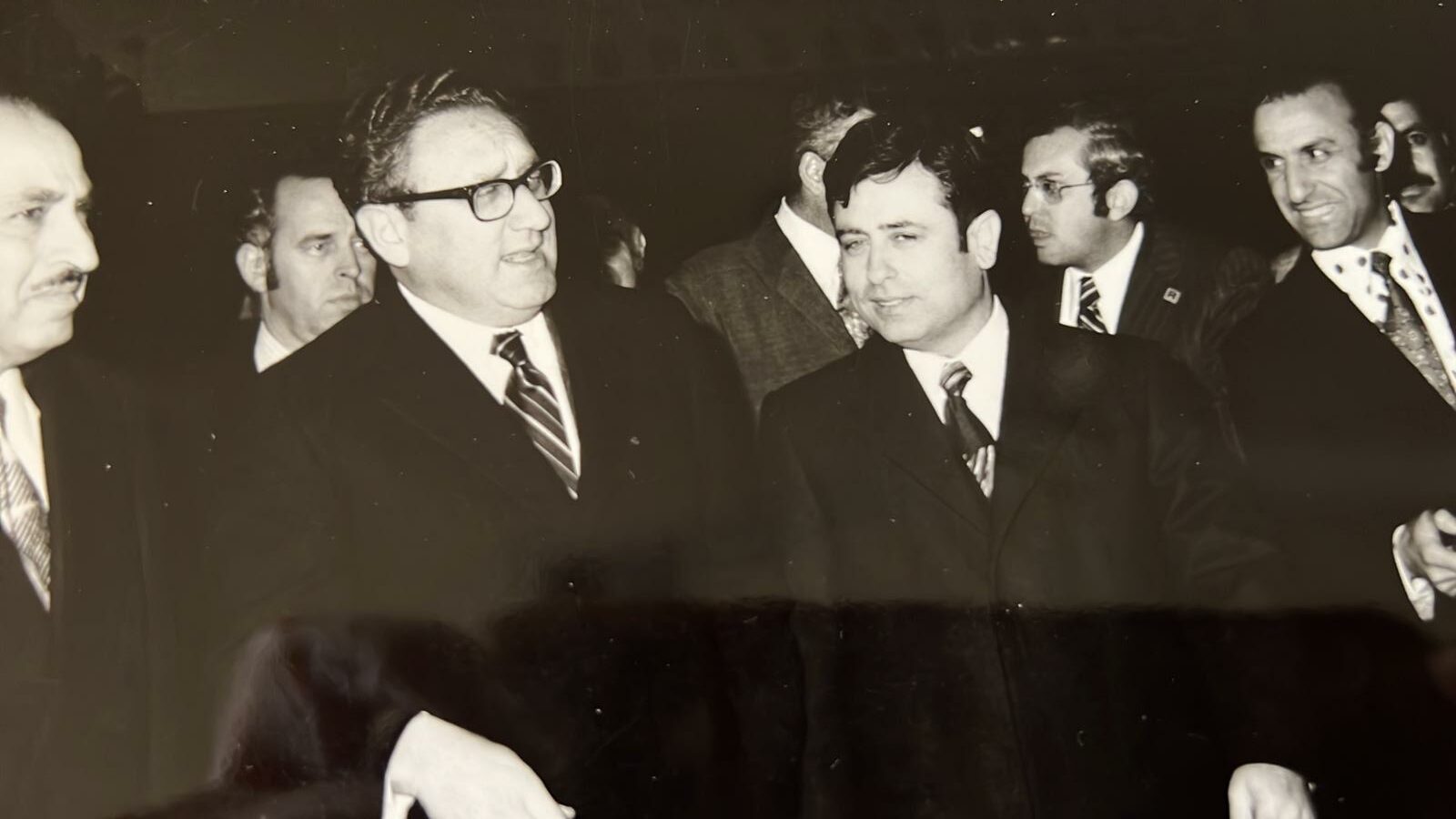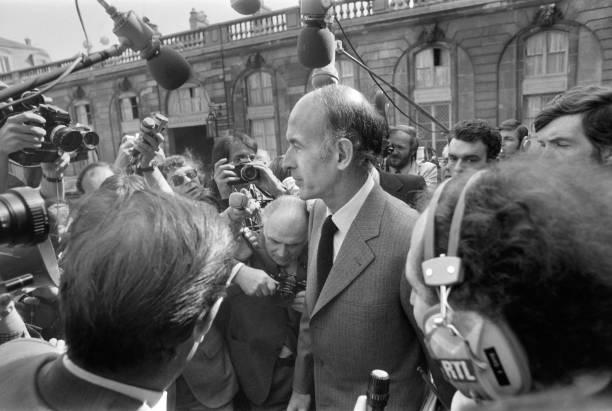EXCHANGE OF TOASTS, AUGUST 23
Press release dated August 24
Secretary Kissinger
Foreign Minister, distinguished guests : It is for all of us a very moving and very important occasion to welcome to the United States for the first time in 15 years the Foreign Minister of Syria. My own acquaintance with Syrians is less than—goes back less than 10 months. At the end of October last year I invited a member of the U.N. delegation to visit Washington, a colleague of Mr. Khaddam’s, the Vice Minister of Foreign Affairs [Zakariya Isma’il]. And when he sat down I said, “Good afternoon,” and he in effect replied, “Before I can give you an answer to this I have to get instructions from Damascus.” [Laughter.] At the end of that meeting I did not say it was a constructive conversation. [Laughter.]
Two months later I was invited to visit Damascus, and I had heard that the Syrians were not the easiest people in the Middle East to deal with—and I might say I have not found in the Middle East easy people to deal with. [Laughter.] I had a conversation with President Asad, which was scheduled for two hours and was still going strong after eight, in which we were negotiating at great length the invitation to the Geneva Conference. And everything was very pleasant and easy, and I didn’t know why the Syrians had acquired the reputation of being difficult—when, at the end of the seventh hour, I made the mistake of asking President Asad whether there was anything in the letter he objected to, and he said, yes, there was one sentence to which he took particular exception, and it was the sentence that said the parties have agreed to go to the conference. [Laughter.] And that is the first time I heard that Syria was not coming to the Geneva Conference. [Laughter.]
Now, since then I have got to know my friends from Syria very well indeed. We spent 32 days negotiating the disengagement on the Golan Heights, and it was a difficult negotiation. But it also was a very moving experience, because it was clear that one reason that Syrians have a reputation for being difficult is because they are also very principled. And as we were engaged in this negotiation, we were really doing two things. We were discussing the lines and all the various military aspects, but beyond that we were making a move from war to peace and toward a consciousness that the people in the Middle East have suffered enough and have proved their courage sufficiently often and that they must learn to coexist in justice and on the basis of a permanent peace that takes into account all their concerns. And given the hatred and suffering that appeared for a generation, it was natural that this would be a very difficult and very prolonged process.
I came away with two determinations, one that President Ford overruled this morning, which was never to have to negotiate with Syrians again. [Laughter.] The second, that the process that has started must be continued. And we must continue to work together for the just and lasting peace that all the peoples in the Middle East deserve. As you all know, this was confirmed by President Ford in his first speech, and it was confirmed by him again in all of his conversations with the Foreign Ministers from Middle East countries that have taken place, including with Foreign Minister Khaddam. At the same time, all of the parties in the Middle East have to understand that this is a process that requires patience and understanding, and I think we have achieved a great measure of it. Speaking for myself and for the American administration, we believe that the visit of Foreign Minister Khaddam has made a major contribution to this process, and we believe that the understanding of each side’s position that is essential has been greatly strengthened.
It is also noteworthy that 10 months ago when Vice Minister Isma’il silently visited me in my office, there were no relations between Syria and the United States. In the interval we have not only formally established diplomatic relations, but I think that the process of exchanges of communications has grown to a remarkable degree, so that our two countries should not be isolated from each other again. That process, too, was greatly strengthened by the visit of the Foreign Minister, and the talks we started will be continued when he returns for the session of the General Assembly.
So I would like to take this opportunity to welcome my friend Foreign Minister Khaddam—to propose a toast to President Asad, to the friendship of Syria and the United States, and to our guest Foreign Minister Khaddam
Foreign Minister Khaddam
Secretary Kissinger, dear friends: Permit me to express my gratitude for the creation of this warm atmosphere which has prevailed during my visit to Washington. Since my arrival in Washington and during the talks which I conducted with Secretary Kissinger and the meeting I had with the President, I have felt that there is a great deal of concern on the part of the American officials and administration on the establishment of good relations between our two countries. Certainly credit should be given to Dr. Kissinger for the key role he played in bringing about the situation, in improving relations, and bringing them to what they are today.
Dr. Kissinger believes that the Syrians are somewhat difficult to negotiate with, and he has attributed this to a number of factors. But Dr. Kissinger realizes very well that those Arabs who made great contributions to world civilization, who provided a great deal to the world, and who have left an impact throughout the world—throughout the ages, throughout history—are people who cannot easily accept injustice which is the result of aggression. We have spread peace throughout hundreds of years because of our belief that peace cannot be established and preserved unless it is based on right and justice. Therefore it was necessary for the Arabs to struggle for peace. Their struggle on behalf of the Palestinians, whose rights have been violated, is only a part of the Arab struggle for the restoration of peace based on justice.
The Arabs want peace, and because of their desire for peace, they were eager to start a dialogue with the United States of America. It was a result of their realization that the United States of America was sincerely eager to make serious efforts for the achievement of peace based on justice in the area.
In concluding my remarks, I would like to reiterate my appreciation and my thanks to Dr. Kissinger for affording me this opportunity to meet so many outstanding American citizens and a goodly number of representatives of the press. Please permit me to convey to you the greetings of the Arab people of Syria, because we believe in the need to establish good relations and relations that will grow better as time goes by between our people and the people of the United States of America. Relations can be good only if they are based on mutual respect, and if such is the case then they will serve not only our mutual cause but the cause of peace throughout the world.
I would like to invite you to join me in a toast to President Ford, a toast to the good relations between our two countries, and a toast to Dr. Kissinger, who indeed played a great role in bringing about the good relations that we enjoy today between our two countries and who made possible for me this very pleasant occasion tonight. And I would like to add to this a toast to Dr. Kissinger, who no longer believes that the Syrians are a difficult people to negotiate with. [Laughter.]


